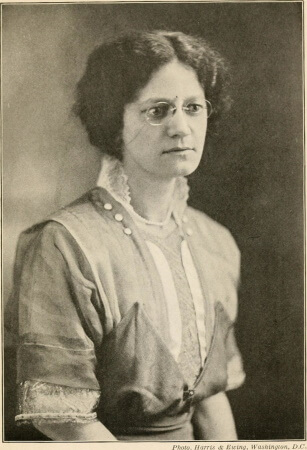Mary Antin
Mary Antin, a Russian Jewish immigrant at the turn of the twentieth century, was a notable author who lived briefly in the tenements shared by immigrants in the old West End.
Mary Antin was born on June 13, 1881 in Russia to Israel and Esther Antin. She grew up in Polotzk, in the Pale of Settlement where Tsarist Russia forced Jewish residents to live in segregated spaces. Tsars Alexander II and III expelled Russian Jews from their homes and deported them from Moscow and St. Petersburg to the Pale of Settlement. This anti-Semitic hostility led over two million Russian Jews to emigrate to Europe, Britain, South America, Palestine, and the United States starting in 1880. The Antins undoubtedly experienced this state-sanctioned prejudice, though their motivation to arrive in Boston was to seek a better life economically. The family was originally affluent, but Israel Antin’s business fell apart after he became sick. In 1891, he borrowed money to travel to Germany, and an emigrant society helped him reach Boston. In 1894, Israel Antin saved enough money for his entire family, including Mary and her siblings, to move to Boston with him. The Antins lived at various times in the old West End and South End, and lived in the tenements with many other immigrants at the turn of the century.
Mary was thirteen and not yet able to speak English, but she thrived in the Boston Public Schools and picked up writing. She learned quickly, passing grammar school in four years. Antin’s teachers referred her poems to education journals in Boston, which published them. Antin also found an editor on Newspaper Row, a historic district of Boston, to publish her poem “My Country,” about the exhilaration of sharing an American citizenship with George Washington. Antin’s first book, published in 1889, was The American Hebrew: From Plotzk to Boston, with the original misspelling of Polotzk kept in the title. The book was a collection of Mary’s letters to her uncle translated from Yiddish. Antin since made money as a writer and lecturer throughout Boston. She attended high school classes at the Hale House in the South End, and there met geology professor Amadeus William Grabeau, whom she married in 1902. Antin moved with Grabeau to New York City and she attended Barnard College for two years, not graduating. Antin was encouraged to write an autobiography by Josephine Lazarus, sister of Emma Lazarus (author of “The New Colossus,” the poem inscribed in the Statue of Liberty). This resulted in The Promised Land, Mary Antin’s account of her life published in 1911.
The West End is a significant part of Antin’s account of her arrival in Boston to join her father. Antin remarked that while her father was on business, she and her family “enjoyed the educational advantages of a thickly populated neighborhood; namely, Wall Street, in the West end [sic] of Boston.” Antin compared her new home at Union Place to her “days of affluence” in Russia and was in awe that the tenement, though plain and shabby, was distinctly American. The Promised Land offered a descriptive first-hand account, for Antin, of “how Wall Street, in the West End, appears in the eyes of a little immigrant from Polotzk.” The book continues with Antin’s family moving to Wheeler Street in the lower South End, from tenement to tenement.
The Promised Land elevated Antin’s status as a writer and has since been published in 34 editions. President Theodore Roosevelt recognized Antin for the book and wrote her letters. Roosevelt credited Antin with motivating him to support women’s suffrage, a cause very important to Antin in subsequent writings and lectures. From 1912 to 1918, Antin went on a national lecture tour arguing for immigrants’ contributions to the country at a time of rising nativism. The lecture tour ended once World War I broke out, and the war was a point of conflict between Antin and her husband. Antin, who supported the Allies, could not coexist with her husband, Grabeau, who passionately supported Germany. Their daughter Josephine recalled that their fighting over the war “was too much for me and I fell apart. They saw what they were doing to me and finally agreed to separate for my sake.” After the separation, Mary Antin experienced serious physical and mental health crises until she died of cancer in 1949.
Article by Adam Tomasi
Source: The Promised Land by Mary Antin (1911), New England Historical Society, Boston Women’s Heritage Trail, GBH, Jewish Virtual Library








